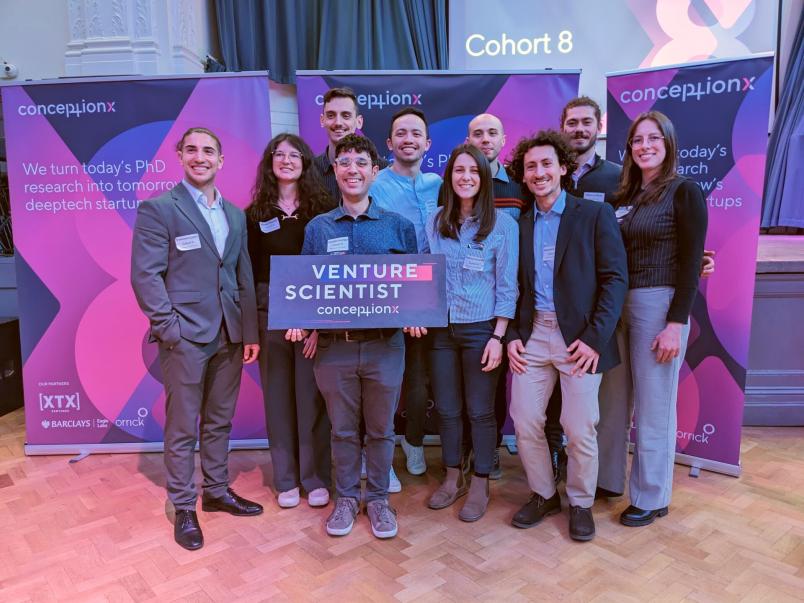
Six Projects led by PhD students from Polito will join the next cohort of Conception X

Six projects from Politecnico di Torino have been selected by the prestigious international program Conception X, dedicated to training PhD students from all over Europe on the topics of entrepreneurship in the field of novel technologies. A significant number, considering that the program has accepted a total of 120 proposals from 42 universities in 8 different countries: the PhD students involved in these projects will thus be able to take part in a competency development program, lasting nine months, which will contribute to the development of their entrepreneurial skills, accompanied in the experience by experts and investors in the sector. The ultimate goal of the program is to support young researchers in designing and launching a startup on the market that can have a positive impact on society.
Conception X is a UK non-profit organisation responsible for one of Europe’s leading entrepreneurial training programmes for young researchers: since 2018, Conception X has trained more than 450 teams of PhD students from over 60 universities in the UK and Europe, who have collectively created more than 120 companies in the Deep Tech sector, that set of innovations based on advanced scientific and engineering discoveries that aim to solve complex and high-impact problems and that find application in sectors such as artificial intelligence, biotechnology, nanotechnology, robotics, renewable energy and quantum computing.
“The high number of applications sent to Conception X by our researchers reveals the interest in entrepreneurship among PhD students – comments the vice-rector of Scientific and technological innovation Giuliana Mattiazzo – We are happy that many of them have been selected to participate in the initiative”.
The six projects of Politecnico di Torino selected
The project ARBoard, in which Giorgio Insigna from DAUIN is involved, aims to create an augmented reality-based application that can simplify Printed Circuit Board (PCB) debugging operations. The debugging phase plays a key role in the development cycle of a printed circuit board and is one of the major expenses for manufacturing companies. The engineer or technician in charge of such operations must find the right location within the PCB and its tangle of components and connectors. Finding the appropriate probing points is labor-intensive and particularly prone to human error. ARBoard extracts the required data from publicly available documents (schematics and placement files), allowing PCB debugging even when the private board design documents are unavailable.
The project e-CO2Synth, in which Federica Zammillo from DISAT is involved, develops an innovative electrochemical system for converting carbon dioxide (CO2), to be installed downstream of emission sources. This technology accelerates the decarbonization of the chemical industrial sector and allows industrial plants and smaller-scale decentralised applications to mitigate their CO2 emissions and adopt circular economy practices. The e-CO2Synth solution is distinguished by its energy efficiency and the ability to operate directly at emission sites, thereby reducing transport costs and enhancing the overall efficiency of the CO2 capture and conversion process. The project is part of the research carried out at the University by the CREST group – affiliated with DISAT – engaged in the study of innovative chemical processes to develop a more sustainable model of society.
The LIGflex project, in which Giacomo Spisni and Tommaso Serra from DISAT are involved, focus on developing a technology for the production of flexible and custom-shaped electrodes, with a potential demand coming from manufacturers of non-standard hydrogen devices, wearable systems, or environmental sensors. Nowadays, realising these products involves complex multiple-step processes and costly re-adaptations on each shape change. The innovative approach offered by LIGflex to this sector is based on laser writing of polymer films: the combination of rapid and cost-effective geometry customisation with a wide choice of materials enables the production of customer-tailored electrodes. The research is part of the studies carried out at in PoliTO by the Materials and Processes for Micro and Nano Technologies group belonging to DISAT.
ORiS project, in which Anna Mauro from DET, Domenico Edoardo Sfasciamuro from DIMEAS, and Francesco Lopez, from DENERG are involved, aims to develop a device capable of transmitting power wirelessly via high-power lasers capable of transmitting kilowatts of power over long distances with high precision and reliability. The first application envisioned by ORiS involves the lunar market, recharging future lunar habitats and powering exploration activities on the lunar surface. This technology can be used in numerous other applications: from active removal of space debris, to wireless power transfer for civil and industrial uses in a terrestrial environment.
PlantZCare project instead involves three doctoral students from DET, in particular Luca Rolle, Mattia Barezzi and Stefano Calvo, and aims to address the inefficiencies of current plant health monitoring systems, which are often invasive, expensive, and inaccurate. Targeting medium to large-scale farms, PlantZCare offers a unique, compact, low-power plant-wearable device that provides real-time, non-invasive analysis of plant health using in-vivo electrical bio-impedance evaluation. This solution enhances resource management and reduces production costs, making it a cost-effective alternative for sustainable agriculture and improved crop productivity. The project is carried out within the research carried out at PoliTO by the eLiONS (electronic Life-Oriented iNtelligent System) group – belonging to the DET – which specifically deals with the design and implementation of intelligent systems for the biomedical and agri-food sectors.
Last but not least, the STARLIGH2T projects in which Debora Ferrari from DISAT is involved, aims to develop solutions capable of expanding the growing green hydrogen market, contributing to the global decarbonization process. This project focuses on the development of a photocatalytic nanomaterial capable of capturing an unprecedented 90% of sunlight, coupled with a customized photoreactor to enable efficient green hydrogen production through water splitting. The simplicity of the technology and the high performance of the photocatalyst make the STARLIGH2T solution highly competitive with the state of the art in the photocatalytic industry. The project is part of the research carried out by the Fabris Research Group.